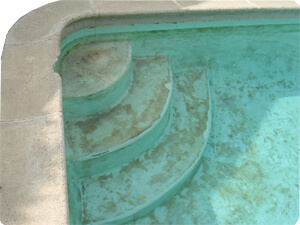FREE Standard Shipping On All Orders $100 or More!*
Pool Stains & Discoloration in a Marcite Pool

So, before I get into the whole ugliness of stains and tips on removing them from plaster pools, I thought I’d first give you my most important tip regarding stains on any pool surface: Keep the water balanced!
Pool stains don’t just happen, they are caused by poor water conditions! The number one reason for staining is poor water balance.
Plaster Pool Stains
Marcite is a common soft plaster finish used on in-ground pools. It starts off white, but it’s important to know as it cures over the years, it will take on a more cloudy white color. This is not staining, it is partly a natural characteristic of plaster and partly calcium deposits. When plaster becomes very thin, you may see the concrete beneath begin to show through in spots, this is not staining either.
The stain colors that most people worry about are red, gray, blue, green, etc. Most of these plaster pool stains are topical, or in the top millimeter of plaster, and can be removed with a little effort. Tougher stains will soak into the plaster and require stronger chemicals to strip away the stain, and maybe a little bit of plaster.
Pool Stain Types
There are many pool stain removers available to assist in stain removal. It’s helpful if you know what type of stain you may have. Is it from debris sitting on the plaster or is it more of an all-over stain or discoloration?
Debris stains: If you look in the pool and see the remains of leaves or dead bugs/worms, then you can be pretty sure this type of stain is caused by the crud. Get that outta there by giving the surface a good brushing. The brushing should loosen the stain and then you can shock the area to bleach out an organic stain.
My tip on plaster pool stains is to always start with the brushing and shock before going in with a bunch of trial and error stain removers. With staining, patience is a virtue. If you have balanced the water, brushed and shocked, and you still find staining, continue reading.
Other stains: These can include pool stains from minerals, like copper, iron or manganese. Minerals can build up from using fill water that is high in minerals, or from copper pipes or a pool heater exchanger when water balance is not correct.
Poor water balance can become corrosive or scaling, and both conditions can cause plaster pool stains.
Drain for Stains?
Right away, folks want to empty the pool and start scrubbing with acid. This really is not the ideal answer. There are many risks to emptying the pool completely, including “floating or popping.” And, cleaning with acid is no picnic, either.

Tip: A fantastic option for a DIY stain fighter without much risk is the NO-Drain acid wash. Made by United Chemical, the kit contains pH lowering acids and the bases to raise the pH after the process is complete in 3-7 days. Although this may not always be as effective as actually draining and acid washing, it is much simpler and safer, and it is useful for those who can't refill their pool from a well.
If you still have stains, after repeated attempts to remove, it may require emptying the pool and acid washing. Tip: Call a professional. This needs to be done right and in a safe manner.
Pool Stain Prevention
The answer to pool stains is prevention, and an ounce of prevention is worth a pound of cure! Here's three tips to prevent pool stains.
- Keep the water balanced. Know what your levels are to avoid staining from minerals and metals.
- If you have metal problems, use a sequestering agent like Metal-Free to keep them in solution.
- Brush your pool surface weekly. Make it part of your routine. You do not need buildup on the surface of the pool, it just causes grief (and pool stains).
Here's two other blog posts that we have done on swimming pool stains, check them out if you need some more pool stain tips:
Swimming Pool Stains Removal Guide
Stains and Discoloration in a Vinyl Liner Pool
I hope you’ll never have to fight pool stains because you read this and decided to keep the water levels balanced. Know what types of minerals and metals are in your water and keep them sequestered, or locked up in solution. Finally, keep your pool brush handy and use it often. Your pool plaster and your water will never look better!